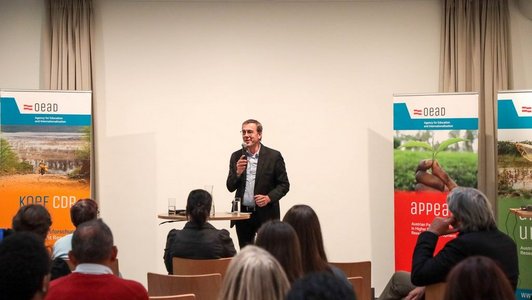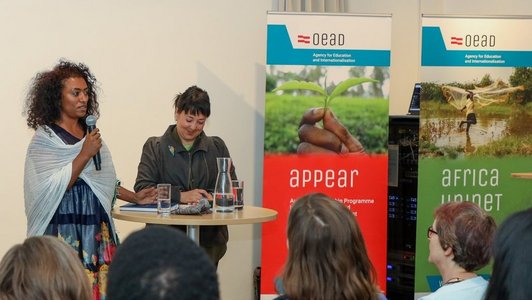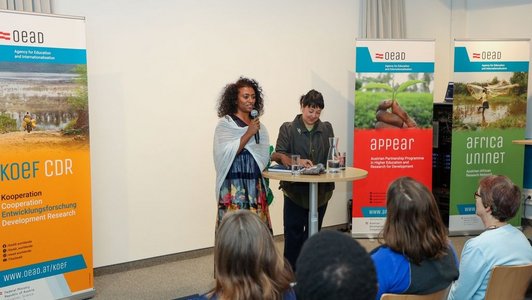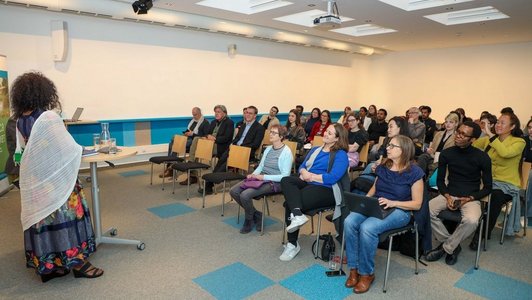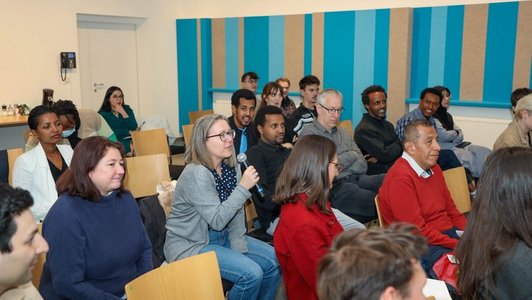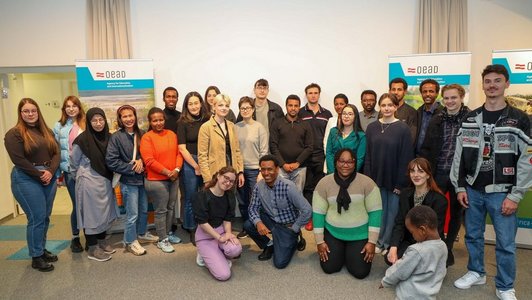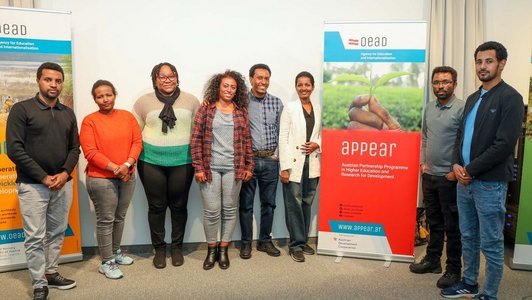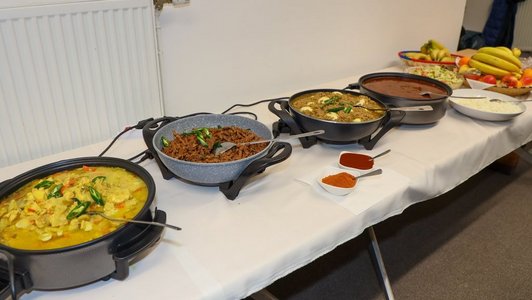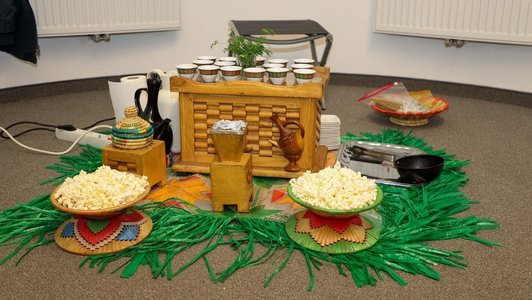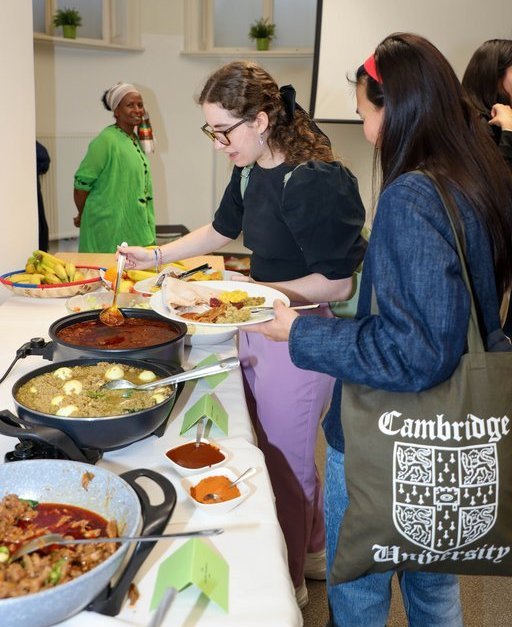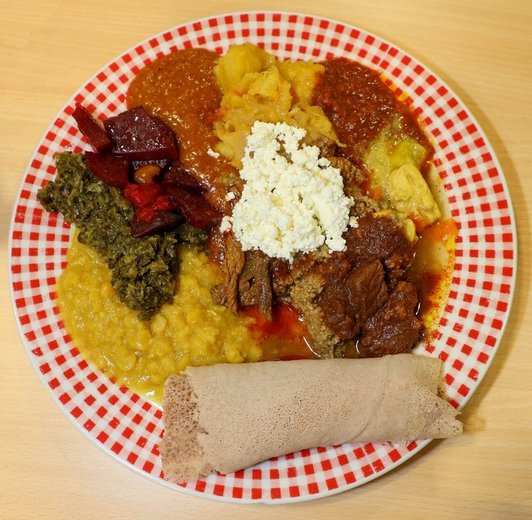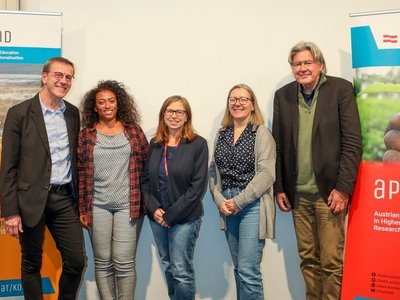

On behalf of the OeAD, Gerhard Volz, Head of International Cooperation in Higher Education, welcomed the guests. He explained that the aim of the Alumni Talks was to invite former scholarship holders to share their professional experiences before and after their stay in Austria with a wider audience. Participants were also invited to have a look at the OeAD.map, which displays registered OeAD-funded projects and allows OeAD scholars to present themselves in an international context. The moderator, Maiada Hadaia, then took over and began the interview by asking Kahsa about her educational journey, which led her to become an associate professor at Mekelle University in Ethiopia and to return to Austria for a research project.
Kahsa graduated in 2006 from Haramaya University in Ethiopia. When she was young and working at Mekelle University, she applied for different scholarships but was not successful because they required longer work experience. She almost gave up, but then she heard about the Master in Animal Breeding and Genetics and and was lucky enough to qualify. As it is a joint European Masters programme, she studied first in the Netherlands, then in Sweden and finally in Austria
Coming to Europe for the first time meant a completely different environment and university system, which made her feel very homesick at the beginning. However, by the time she arrived in Vienna, she had learnt to cope with the new situation and felt fit for the system. During her Master's degree at the University of Natural Resources and Life Sciences, BOKU, Vienna, she was supervised by Prof. Hans Sölkner and Dr. Maria Wurzinger, who were very encouraging, she made new friends, visited the Austrian countryside and Austria became her second home.
Doctoral studies
After graduating in 2009, she returned home to resume her work at Mekelle University. However, she had always dreamed of a scientific career and was eager to start her doctoral studies on "Dynamic Systems Modelling of Breeding Sheep Populations in Ethiopia" at BOKU under the same supervisor. At the time, she had to leave her 5-month-old daughter at home. Having a very supportive husband enabled her to concentrate on her research. For her doctoral studies, she received an APPEAR scholarship, financed by the Austrian Development Cooperation (ADC). The moderator explained that Ethiopia has been an ADC partner for more than 30 years and that several scholarships and projects between Austrian and Ethiopian institutions have been funded.
Kahsa has been collaborating with BOKU since she finished her PhD, she was a visiting researcher at BOKU in 2016, and she has been involved in summer school teaching several times. Kahsa is currently a member of the advisory boards of the APPEAR project LoCaBreed with institutions in Burkina Faso and the European Master in Animal Breeding and Genetics at BOKU. Another opportunity for cooperation is the Africa-UniNet, where Mekelle University became a member institution last year. Kahsa represented her university during the 3rd Africa-UniNet General Assembly in September 2023 in Vienna.
Research interests
One of her research goals is to improve the livelihoods of smallholder farmers. Academic cooperation between South and North can strengthen technical capacities. However, Kahsa is convinced that technology cannot simply be transferred, but must be adapted to the specific context together with local communities.
Another issue relevant to Ethiopia is climate change. Lack of data is an issue, but sometimes the capacity to process the data is also lacking. Again, academic cooperation and technical support are crucial. But experts need to be trained to work in the local context. Cooperation between the North and the South, as well as between Southern countries themselves, is therefore a key element in building the capacity of Southern livestock experts and in designing future projects and breeding programmes.
Being a female researcher in male dominated sector
The moderator then asked about the animal breeding sector, which seems to be male-dominated, and how she had experienced this situation. Kasha agrees that women are not much involved in the scientific field of animal breeding and that there are only a limited number of female researchers. In general, she works well with her colleagues, but it takes hard work and commitment. When asked if she could pass on this idea of courage to younger female colleagues, she talked about a mentoring project at her university.When new female colleagues start work, they are assigned to one of the senior female researchers who supports and empowers them.
Overall, her education has had a positive impact on her life, fostering personal growth in various aspects. Academic cooperation has contributed to her expertise and excellence in her field. Particularly as a woman in a developing country, these opportunities have been crucial to her career advancement. In addition to better access to education and educational resources, studying in Europe. Meeting people from all over the world and learning about their unique cultures and histories was enriching. she gained a greater understanding of and appreciation for cultural differences and became proficient in respecting and navigating them. For all the scholars who are present she would like to give on advice “if you need information just ask, don’t be shy and look for opportunities to cooperate.
In recent years, her work and personal life have been limited by the conflict in Ethiopia. During that time, the university was closed, everything was shut down, research was not possible and everything was a question of survival. She expressed her gratitude that due to the current research project (financed by the OeAD programme Cooperation Development Research) is finally allowing her to get back to doing what she loves best: research. The main objective of the project is to provide advanced knowledge and skills in genomic data analysis to an animal breeding expert from Ethiopia. The project is a collaboration between BOKU-Austria and the International Livestock Research Institute (ILRI)-Kenya. In addition to building the capacity of experts from the South, the project aims to strengthen the existing partnership between BOKU, ILRI, Mekelle University and other Ethiopian institutions, foster new collaborations and generate additional funding.

